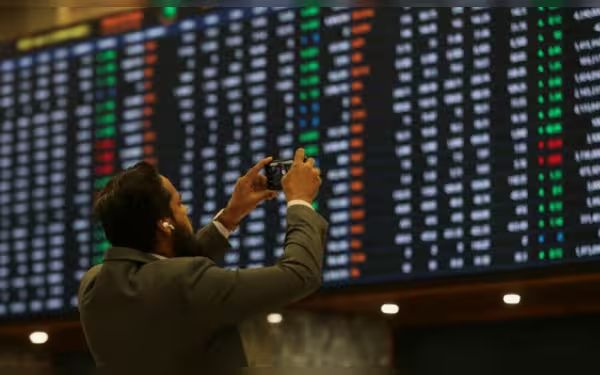Friday, October 4, 2024 12:21 PM
KSE-100 Index Sees Mixed Trading Amid Geopolitical Tensions
- KSE-100 closes higher by 162 points despite late-session selling.
- Geopolitical tensions impact market sentiment and trading activity.
- Pakistan's trade deficit widens to $5.4 billion in Q1 FY 2024-25.
 Image Credits: brecorder
Image Credits: brecorderKSE-100 Index closes higher by 162 points amid geopolitical tensions and widening trade deficit.
The Pakistan Stock Exchange (PSX) has been a focal point of economic activity, reflecting the country's financial health and investor sentiment. On Wednesday, the benchmark KSE-100 Index experienced a day of mixed trading, ultimately closing marginally higher by 162 points. This fluctuation in the index is indicative of the current economic climate, influenced by both local and international events.
The trading session began on a negative note, with the KSE-100 hitting an intra-day low of 81,529.45. However, the market soon saw a surge as buyers stepped in, pushing the index to an intra-day high of 82,360.29. This upward momentum was short-lived, as late-session selling trimmed the earlier gains, leading to a final close at 81,967.01, which represents an increase of 162.41 points or 0.20%. According to Topline Securities, a brokerage house, "The session saw significant volatility, peaking at 82,360 and dipping to 81,529, largely due to geopolitical tensions in the Middle East."
Key contributors to the index's performance included major players such as UBL, FFC, MCB, ENGRO, and PKGP, which collectively added 270 points to the index. The backdrop of these movements was marked by escalating geopolitical tensions, particularly following Iran's missile attack on Israel. Iran announced that its missile strikes were concluded, barring any further provocations, while Israel and the United States vowed to respond decisively, raising fears of a broader conflict.
In addition to these international developments, Pakistan's economic indicators also played a role in shaping market sentiment. The Pakistan Bureau of Statistics (PBS) reported a slight widening of the trade deficit to $5.4 billion during the first three months of the fiscal year 2024-25. This figure represents a 4.2% increase compared to the same period last year, highlighting ongoing challenges in balancing exports and imports.
On the previous day, the KSE-100 had closed significantly higher by 690 points, buoyed by expectations of a potential cut in the policy rate. However, the global market environment was less favorable, with Asian stocks declining in response to the sell-off on Wall Street, driven by concerns over the geopolitical situation. Crude oil prices also rose, reflecting fears of supply disruptions.
In the currency market, the Pakistani rupee remained stable against the US dollar, appreciating by 0.02% to settle at 277.64. This stability is crucial for maintaining investor confidence amid fluctuating market conditions. Trading volume on the all-share index increased slightly, with 360.99 million shares changing hands, although the total value of shares traded decreased to Rs15.39 billion.
Agha Steel Industries emerged as the volume leader, followed by WorldCall Telecom and Fauji Cement, indicating a diverse range of sectors participating in the trading activity. Out of 448 companies traded, 164 saw their shares rise, while 221 experienced declines, and 63 remained unchanged, showcasing the mixed sentiment among investors.
The recent trading activity on the PSX reflects a complex interplay of local economic factors and international geopolitical tensions. Investors are advised to remain vigilant and informed, as these dynamics can significantly impact market performance. Understanding these trends is essential for making informed investment decisions in an ever-evolving financial landscape.













